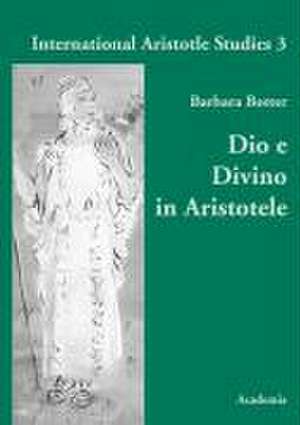Dio e Divino in Aristotele
Autor Barbara Botterit Limba Italiană Hardback – 31 mai 2005
Preț: 356.60 lei
Nou
Puncte Express: 535
Preț estimativ în valută:
68.24€ • 70.98$ • 56.34£
68.24€ • 70.98$ • 56.34£
Carte indisponibilă temporar
Doresc să fiu notificat când acest titlu va fi disponibil:
Se trimite...
Preluare comenzi: 021 569.72.76
Specificații
ISBN-13: 9783896653376
ISBN-10: 3896653377
Pagini: 308
Dimensiuni: 156 x 216 x 24 mm
Greutate: 0.5 kg
Editura: ACADEMIA VERLAG
ISBN-10: 3896653377
Pagini: 308
Dimensiuni: 156 x 216 x 24 mm
Greutate: 0.5 kg
Editura: ACADEMIA VERLAG
Notă biografică
Barbara
Botter
è
Dottore
di
Ricerca
in
Filosofia
Antica
in
Italia
e
Francia
ed
è
attualmente
Cultore
della
Materia
presso
l'Università
Ca'
Foscari
di
Venezia.
I
suoi
interessi
spaziano
dalla
teologia
aristotelica
al
problema
delle
cause
e
della
relazione
tra
necessità
e
fine
nei
trattati
zoologici
di
Aristotele.
